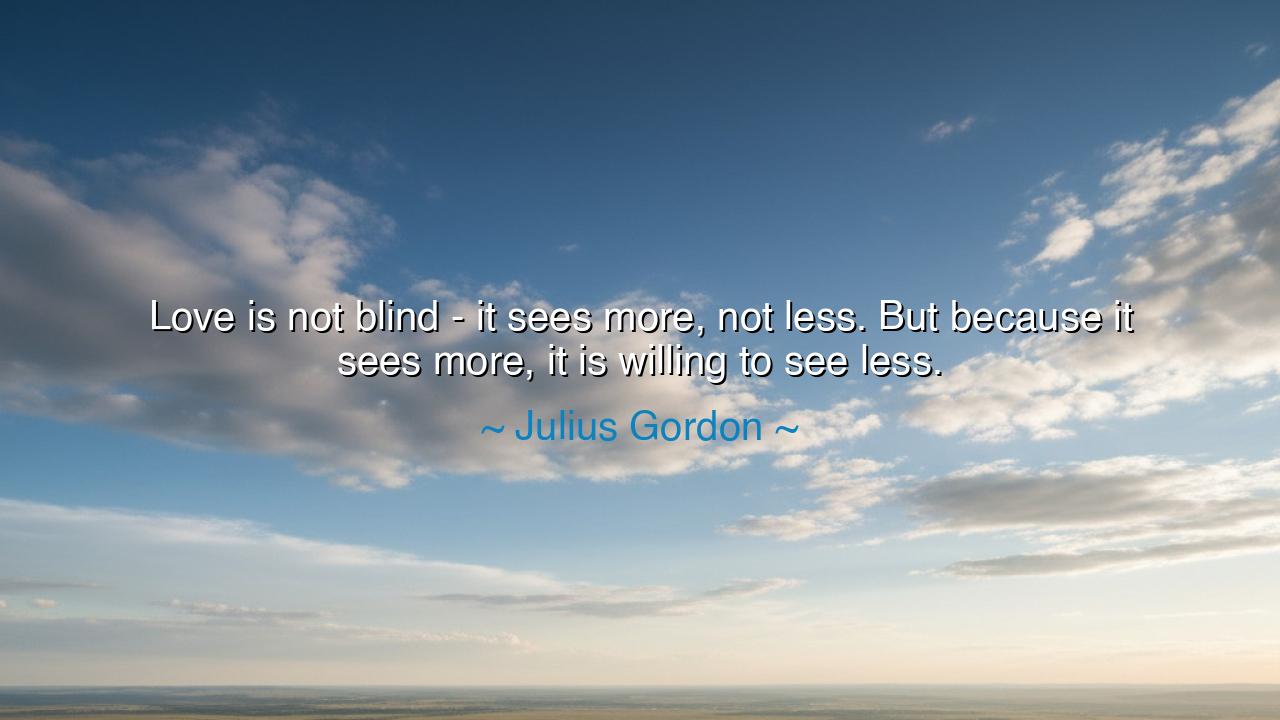
Love is not blind - it sees more, not less. But because it sees
Love is not blind - it sees more, not less. But because it sees more, it is willing to see less.






In the gentle wisdom of the ages, Julius Gordon once wrote: “Love is not blind — it sees more, not less. But because it sees more, it is willing to see less.” These words, tender yet profound, reveal the deepest mystery of the human heart. For in them lies the paradox of true love — that to love someone wholly is not to ignore their flaws, but to behold them clearly, and yet choose kindness over judgment. Love is not the blindness of ignorance, but the vision of understanding; it sees the truth of imperfection, yet chooses mercy. In its highest form, love is not deceived — it is forgiving.
When Gordon spoke these words, he gave voice to a truth often misunderstood. Many say, “Love is blind,” as though affection hides the faults of those we cherish. But Gordon turns this belief on its head. He reminds us that love does not close its eyes — it opens them wider. It sees the cracks, the struggles, the contradictions of the beloved, and still finds beauty there. For true love does not depend on perfection; it is born of compassion. Where others see failure, love sees effort; where others see weakness, love sees the courage to endure. Thus, love is not an illusion but an awakening — the heart’s clear-sighted choice to value the soul above its shadows.
The origin of this insight lies deep in the nature of relationships themselves. Those who have loved — be it a parent for a child, a friend for a friend, or a partner for a partner — know that love must evolve from admiration to acceptance. In the beginning, love may idealize; it sees only light. But as time passes, the veil of enchantment falls, and the beloved stands revealed — human, flawed, imperfect. It is then that love is tested. If it is shallow, it falters; but if it is deep, it transforms into something higher — the love that chooses to see less, not from denial, but from wisdom. For it understands that to dwell endlessly on faults is to kill joy, and that mercy is stronger than perfection.
Consider the story of Mahatma Gandhi and his wife, Kasturba. Their marriage, begun in youth, was not one of unbroken harmony. Gandhi, in his early years, was proud and often harsh; Kasturba was strong-willed and challenged him openly. Yet over decades of shared struggle — through imprisonment, illness, and sacrifice — they came to a deeper understanding of each other. Gandhi later admitted that it was her patience, her quiet strength, that taught him humility and grace. He saw her flaws clearly, as she saw his — yet both chose forgiveness over resentment. In their union, we see Gordon’s wisdom made flesh: love that sees everything, yet chooses peace over pride.
When love sees more, it grows wise. It learns that all human beings are fragile tapestries — woven of light and shadow, beauty and brokenness. It understands that judgment destroys what tenderness can heal. This is why love, in its purest form, becomes an act of humility. It says: “I see your imperfection, and I will not hold it against you. I, too, am imperfect, and I hope you will do the same.” Such love is the foundation of every lasting bond, whether between lovers, friends, or families. It is not blindness that sustains relationships, but compassionate vision — the ability to see truth and still choose grace.
Yet this way of loving requires courage. To love with open eyes is to make oneself vulnerable. It means accepting that pain may come, that disappointment is possible. But love is not afraid of pain, for pain is the price of connection. The one who truly loves does not run from imperfection; they embrace it as part of the sacred work of the heart. The ancients understood this: the poet Rumi wrote, “The wound is the place where the light enters you.” So too, the imperfections of those we love are not barriers, but doorways through which love deepens. They teach us patience, empathy, and the divine art of forgiveness.
And so, dear listener, let the wisdom of Julius Gordon guide you: do not seek love that blinds you to reality, but love that strengthens you to face it. See those around you not through the eyes of criticism, but through the eyes of understanding. When anger rises, remember the goodness that first drew your heart. When disappointment comes, look again, and you will see the beauty that endures beneath the surface. Choose to see less — not because you are deceived, but because you are wise enough to know that love’s perfection lies not in faultlessness, but in forgiveness.
For in the end, love that endures is not built on illusion, but on mercy. It does not deny flaws; it transcends them. It does not close its eyes; it opens the heart. To love truly is to see more — and yet, because you see more, to be willing, again and again, to see less. This is the love that mends the world, the love that reflects the divine, the love that, though human, touches eternity.






AAdministratorAdministrator
Welcome, honored guests. Please leave a comment, we will respond soon